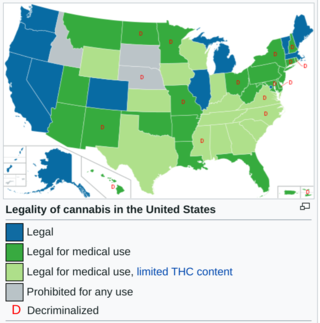
Cannabis is the most commonly used psychotropic drug in the world. Because so many young people use cannabis, it's important to understand its short- and long-term side effects. However, due to conflicting research findings, there remains widespread debate about the impact that moderate-to-heavy cannabis use has on the developing brain and cognitive functioning.
In this post, I'll share a handful of evidence-based studies, a few anecdotal stories, and some meta-analyses that exemplify why there's so much confusion and uncertainty about how cannabis use during someone's teenage years impacts his or her cognitive performance. After establishing the lack of scientific agreement on the neurocognitive effects of cannabis use during adolescence, we'll look at a new University of Colorado Boulder study (Ellingson et al., 2020) on this topic published on September 3 in the journal Addiction.
First author Jarrod Ellingson, assistant professor of psychiatry at the CU School of Medicine, and co-authors explain the impetus behind their latest sibling-comparison study on the effect of moderate‐to‐heavy cannabis use on cognitive functioning in adolescents:
"Due to changes in the legality of recreational and medical cannabis and widespread access in many states, valid empirical data must be available to inform policy and public health decisions, including how cannabis use may affect the developing brain."

The decision by some U.S. jurisdictions to legalize or decriminalize marijuana is a hot-button issue. As this "Legality of Cannabis in the United States" map shows, even though the possession of cannabis is illegal under federal laws contained in the Controlled Substances Act (CSA) of 1970, the legality of marijuana varies from state to state.
One psychological consequence of legalization and decriminalization is that the general public increasingly assumes that marijuana use is "harmless," "safe," and, in some cases, "good for you." Many people view cannabis as having medicinal benefits and, to a large degree, it's lost its "Reefer Madness" stigma as a dangerous illicit substance. In my opinion, destigmatizing marijuana use isn't necessarily a bad thing, but widespread acceptance also creates a ripple effect of complicated consequences.
For example, reports from the annual Monitoring the Future (MTF) survey of drug use and attitudes among middle and high school students in the United States shows that as teens' perceptions about the risks of marijuana have steadily decreased over the past decade, moderate-to-heavy cannabis use among adolescents has steadily increased in tandem.
In 2019, the nationwide MTF survey found that 11.8 percent of 8th graders in the U.S. reported using marijuana in the past year and 6.6 percent had used it in the past month. Among 12th graders, 35.7 percent said they'd used marijuana during the year prior to the survey, 22.3 percent had used it in the past month, and 6.4 percent said they used marijuana daily or almost every day.
Runner's High: This Is Your Brain on Self-Made Endocannabinoids
Anecdotally, as someone who did way too many bong hits on a daily basis during high school, I believe that heavy cannabis use thwarted my cognitive capacity from the age of 13 to 16; from 8th to 11th grade, I was a straight C- student with abysmal SAT scores.
Having a marijuana use disorder also exacerbated my depressive symptoms and made me feel hopeless and hollow inside. So, I stopped smoking pot the summer before my senior year of high school (it was 1983; I was 17) and started substituting my cannabis high with a "runner's high" created by the self-produced endocannabinoids that flooded my brain during daily jogs. Thankfully, my brain bounced back and my cognitive performance improved; I zipped through college in three years.
Of course, my history of cannabis use during adolescence is completely unscientific anecdotal evidence and should be taken with a grain of salt. To be fair and balanced, let's look at some science-based empirical evidence that contrasts my personal observations about adolescent cannabis use.
Cognitive Deficits Associated With Cannabis Use May Have Been Overstated
A few years ago, one of the largest longitudinal twin studies (Jackson et al., 2016) to investigate the impact of adolescent marijuana use on intelligence quotient (IQ) scores found "little evidence to suggest that adolescent marijuana use has a direct effect on intellectual decline."
Another recent systematic review and meta-analysis (Scott et al., 2018) asked: "Is frequent or heavy cannabis use associated with cognitive dysfunction in adolescents and young adults?" After reviewing sixty-nine studies that involved 2,152 cannabis users with an average age of 20.6 years old, J. Cobb Scott and co-authors concluded that "previous studies of cannabis [use] in youth may have overstated the magnitude and persistence of cognitive deficits associated with use."
On the flip side, numerous studies have identified a link between heavy marijuana use, poorer cognitive functioning, and memory impairments. For example, another review (Jacobus & Tapert, 2014) of the effects of cannabis on the adolescent brain concluded that "teens who engage in heavy marijuana use often show disadvantages in neurocognitive performance, macrostructural and microstructural brain development, and alterations in brain functioning."
About five years ago, a Molecular Psychiatry study (Riba et al., 2015) on cannabis use and memory function concluded that "cannabis users have an increased susceptibility to memory distortions even when abstinent and drug-free, suggesting a long-lasting compromise of memory and cognitive control mechanisms involved in reality monitoring."
As you can see, there aren't any universally agreed upon, concrete conclusions about how marijuana use affects memory and cognition. Unfortunately, all of this seemingly contradictory empirical data makes well-informed policy-making decisions especially challenging for public health advocates.
Cannabis Use During Adolescence May Negatively Impact Verbal Memory
Because there's so much indefiniteness surrounding the impact that cannabis use during adolescence has on cognitive functioning, Ellingson's team at the University of Colorado School of Medicine designed a sibling-comparison study that looked at the effect of moderate‐to‐heavy cannabis use on cognitive functioning in adolescents over a seven-year period (from age 17-24). As mentioned, their latest (2020) findings were recently published in the journal Addiction.
"We wanted to expand our understanding of whether cannabis use is related to lower cognitive functioning," Ellingson said in a news release. "There's a large body of evidence that cannabis use is linked to cognitive functioning, but we know that cannabis use is not isolated from other important risk factors. That was the primary motivation behind this study, in which we compared siblings to account for many of these risk factors."
This study included 1,192 adolescent participants from 596 different families. Marijuana use was assessed via clinical interviews; cognitive abilities were measured using a neuropsychological battery of tests. The researchers collected two waves of data. The first wave was collected from 2001 to 2006, when participants had an average age of 17; the second wave of data was collected from 2008 to 2013, when the study participants' average age was 24.
Ellingson et al. found that a "greater frequency and earlier onset of regular cannabis use were associated with poorer cognitive performance, specifically on tests of verbal memory." Based on these findings, the authors conclude: "Moderate adolescent cannabis use may have adverse effects on cognitive functioning, specifically verbal memory, that cannot be explained by familial factors."
"More work needs to be done to determine how cannabis use is related to cognitive functioning, and we hope that our study can help inform future study designs," Ellingson noted. "These studies are particularly important because cannabis is becoming more potent and more accessible as states legalize its recreational use."
"impact" - Google News
September 03, 2020 at 02:00PM
https://ift.tt/3lRcGs5
Cannabis Use Has a Debatable Impact on Cognitive Functioning - Psychology Today
"impact" - Google News
https://ift.tt/2RIFll8
Shoes Man Tutorial
Pos News Update
Meme Update
Korean Entertainment News
Japan News Update
Bagikan Berita Ini














0 Response to "Cannabis Use Has a Debatable Impact on Cognitive Functioning - Psychology Today"
Post a Comment